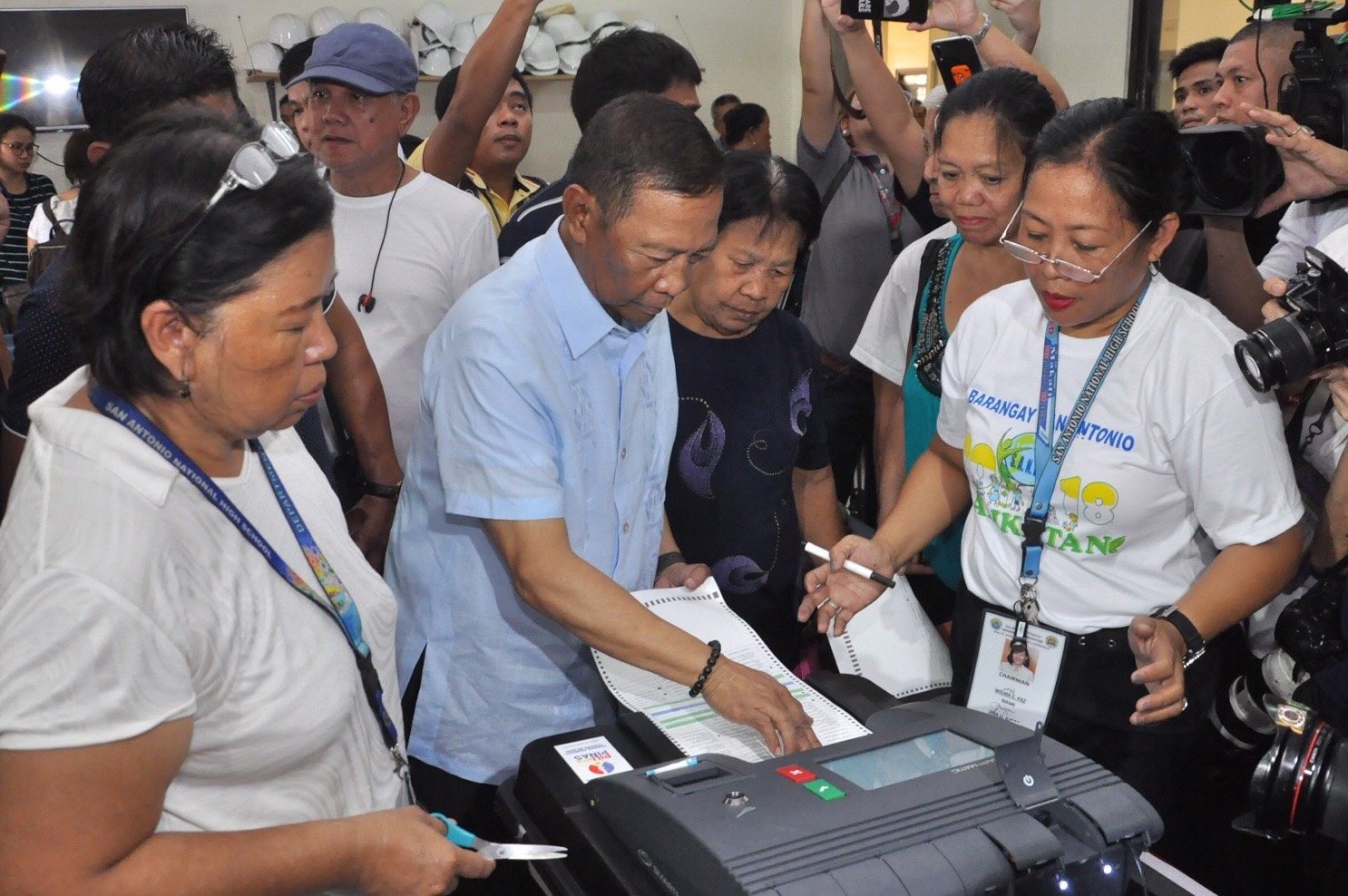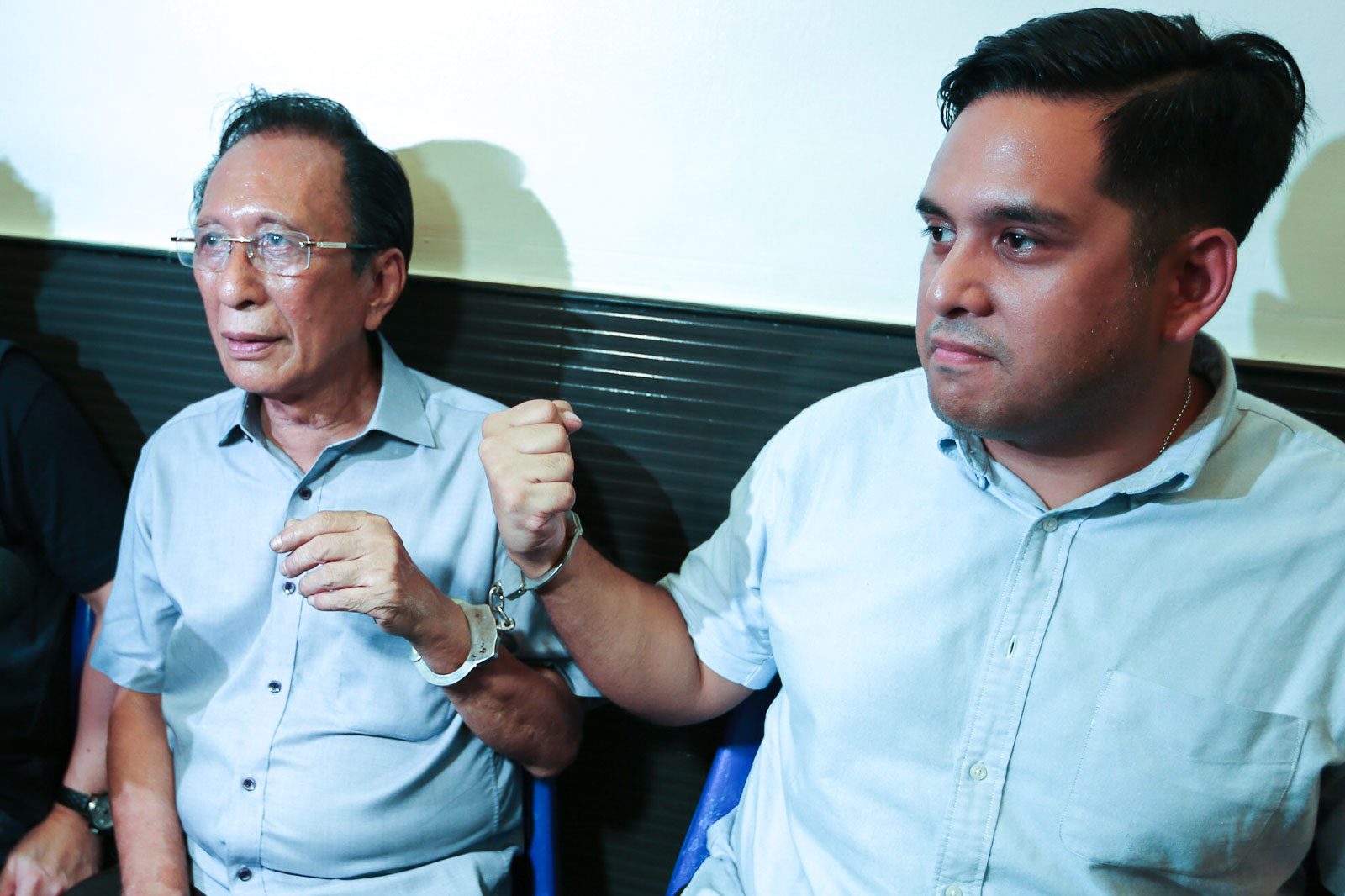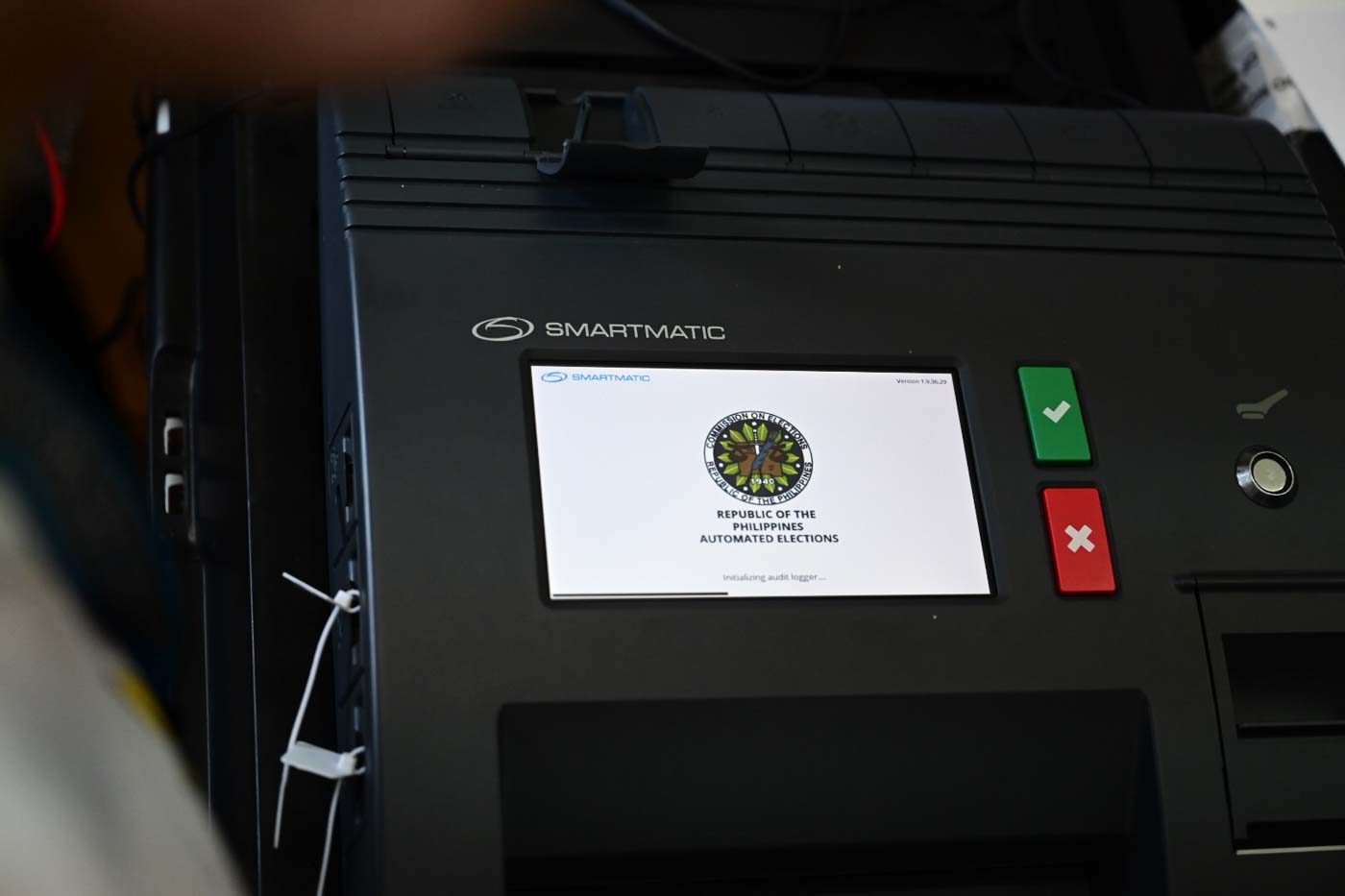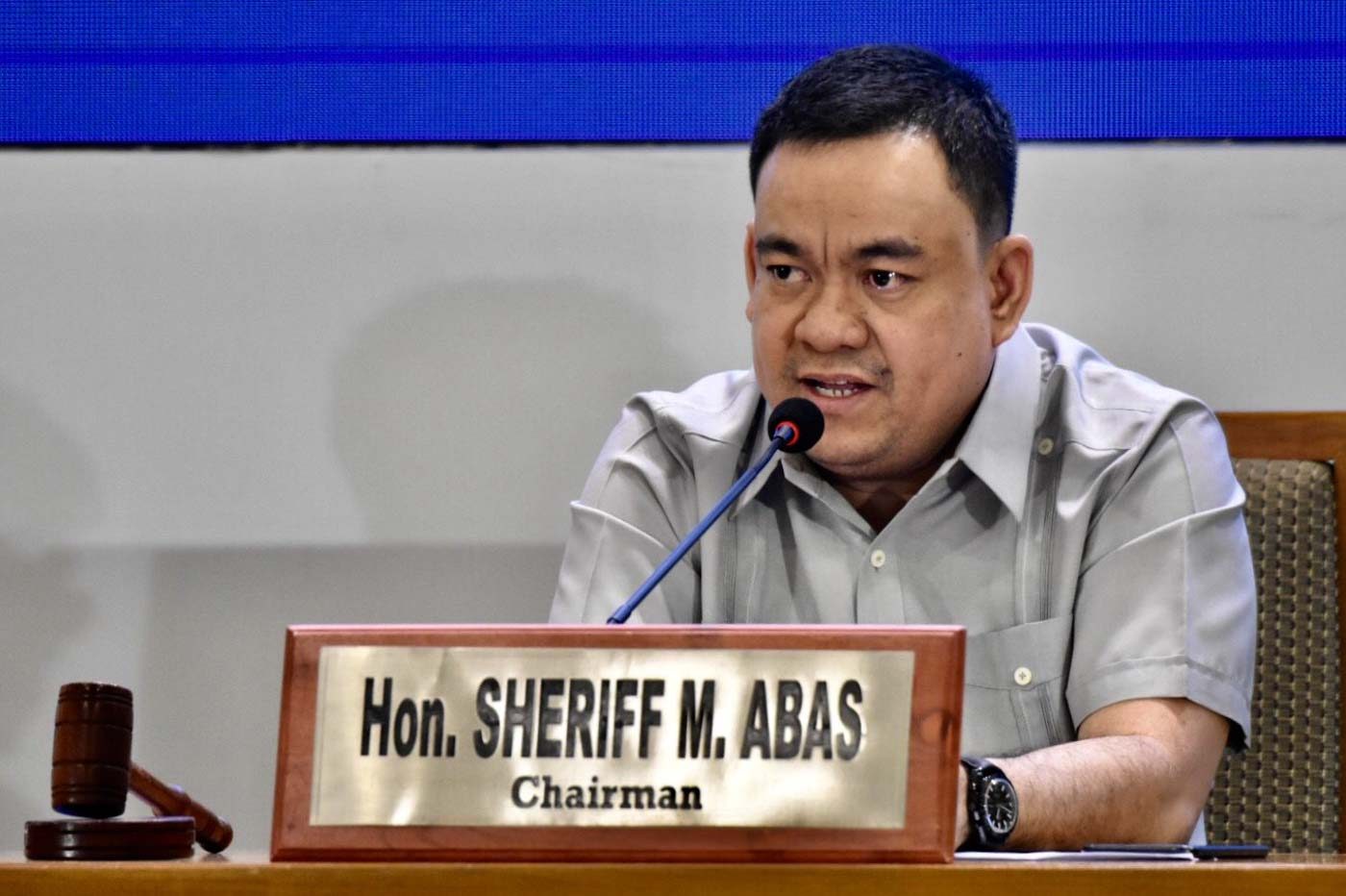SUMMARY
This is AI generated summarization, which may have errors. For context, always refer to the full article.

MANILA, Philippines – President Rodrigo Duterte cast doubt on the election system when he told the Commission on Elections (Comelec) on Thursday evening, May 30, to stop using Smartmatic vote-counting machines (VCMs).
The Philippines has used Smartmatic VCMs – previously known as precinct count optical scan (PCOS) machines – since its first automated elections in 2010.
In 2016, Duterte himself was elected using Smartmatic VCMs. Two years later, the Comelec decided to buy the 97,000 VCMs used in 2016. This year, Duterte’s senatorial candidates won by a landslide in elections that used the same machines.
Duterte on Thursday, however, challenged the Comelec, “Dispose of that Smartmatic, and look for a new one that is free of fraud.”
The “Punisher” told the Comelec, an independent constitutional body now dominated by Duterte appointees: “You have 3 years.”
He said using Smartmatic “is no longer acceptable to me, to the people, and even to the congressmen who are here.”
Should the Comelec reuse Smartmatic VCMs in 2022, when the Philippines elects Duterte’s successor?
This is not the only question hounding the Comelec after a host of problems, from end to end, marred the recent polls. Here’s a rundown of issues during the Philippines’ 4th automated elections:
- 1.029 million “bleeding” marking pens had to be replaced
- 961 VCMs bogged down, higher than the 801 VCMs that had to be replaced in the 2016 elections
- 1,665 out of 85,000 SD cards malfunctioned – almost 14 times more than the 120 SD cards found defective in 2016
- The Transparency Server stopped releasing election results to the media and election watchdogs for 7 hours, giving rise to speculations of cheating (READ: [EXPLAINER] Transmission glitches don’t necessarily mean electoral fraud)
Other problems include rampant vote-buying and controversies surrounding the party list.
What exactly happened, and how does the Comelec plan to move forward after all these?
1. Problems with VCMs, marking pens, and SD cards
Incompatibility between VCMs and election paraphernalia posed a major problem in the recent polls.

The Comelec said this was because the law required them to get election paraphernalia from different suppliers.
This was opposed to previous automated elections when the bidding of election paraphernalia was “bundled,” meaning there was only one supplier of VCMs, marking pens, paper, and SD cards: technology provider Smartmatic.
Comelec Chairman Sheriff Abas said, however, that the poll body cannot do anything about this “because that’s part of the procurement law.” (READ: Comelec on election woes: Hands tied due to procurement law)
Abas said that even if the Comelec preferred Smartmatic’s SD cards, they could not have sourced the SD cards from the same company because the cost of their bid was P70 million ($1.34 million). The winning supplier, on the other hand, offered the SD cards for P29 million ($556,145).
The “lowest bidder rule” is, in other words, a problem, said Comelec Commissioner Rowena Guanzon, a former commissioner of the Commission on Audit.
“Ayan, lowest bidder, cheap din,” Guanzon said. (There, it’s the lowest bidder, so it’s cheap too.)
Ona Caritos, executive director of election watchdog Lente, is also wary about the rule on the lowest calculated bid.
“Yes, kasi at the end of the day, dapat tumutugma or nagja-jive ang parts na ‘yan with the different parts in the automated election system,” Caritos said. (Yes, because at the end of the day, those parts should match or jive with the different parts in the automated election system.)
Caritos said however that the breakdown of VCMs shouldn’t automatically be equated with election fraud.
“Dapat i-convince natin ang mga tao na normal in a big operation, like what we had a few weeks ago, na may breakdowns talaga,” she said. (We need to convince people that it is normal in a big operation, like what we had a few weeks ago, to have breakdowns.)
She said that “the better question to ask Comelec” is how quickly they replaced defective machines and corrupted SD cards on election day. “Because that would affect the voting of people. Because if people would not wait for the machine to be fixed or replaced, of course they will be disenfranchised.”
2. Pitfalls of Comelec’s vote-buying crackdown
The night before elections came with a shocker.
Quezon City mayoral candidate Bingbong Crisologo was arrested on May 12 for alleged obstruction of justice in a suspected vote-buying site. Crisologo allegedly intervened when policemen tried to arrest his staffers who were accused of vote buying.
The Philippine National Police eventually filed a vote-buying case against Crisologo.

Hours before Crisologo was arrested, in Navotas, the National Bureau of Investigation (NBI) conducted a warrantless raid on a poll watchers’ briefing in the city. The NBI later cleared a coordinator of vote-buying allegations.
Crisologo’s arrest and the Navotas raid were part of the government’s stepped-up drive against vote-buying. The Comelec even formed an anti-vote-buying task force along with other law enforcers this year.
Beyond the 2019 elections, Abas said the poll body wants to give more teeth to its policies against vote-buying.
“Sana magkaroon ng separate legislation o batas on vote-buying (I hope there will be a separate legislation or law on vote-buying),” he said, adding that the Comelec plans to discuss this with Congress.
While hailing the vote-buying crackdown, election watchdog Lente, however, warned that this is “prone to abuse” as local police can be influenced by politicians, especially incumbent officials.
Rappler news editor Miriam Grace Go, in an interview during Rappler’s special coverage of the May 13 elections, said that “the well-intentioned campaign to prevent vote-buying” had been “twisted and weaponized” by partisan groups to work against political rivals.
“We continue to ask citizens to report vote-buying incidents but also for them to be careful not to be used when one camp is just trying to spread black propaganda against the other one,” Go said.
Still, the tougher challenge is changing people’s mindsets.
It doesn’t help that the President himself, a longtime politician from Davao City, calls vote-buying an “integral” part of Philippine elections.
3. Party-list challenge
Beyond technical problems, the Comelec also faced questions about its own rules. Ronald Cardema, chairman of the party-list group Duterte Youth, requested at the last minute to be a substitute party-list nominee, in what critics described as an “abuse” of the party list.
Cardema filed a petition for substitution as the party-list group’s nominee on Sunday, May 12, the eve of elections, after all its original 5 nominees simultaneously withdrew from the party-list race. The filing was received by the poll body’s law department at 5:30 pm, past office hours.
More than 10 petitions have been filed to oppose Cardema’s substitution bid, with petitioners arguing it was illegal.
Critics also said Cardema skirted rules requiring appointive officials to resign from their posts after filing their bids for candidacy.

Cardema, who served as National Youth Commission chair throughout the election season, was accused of using his position and government resources to campaign for Duterte Youth. He’s also 3 years over the age limit to be a representative for the youth sector.
Lawmakers such as Senator Panfilo Lacson and Muntinlupa District Representative Ruffy Biazon took to social media to call out Cardema’s bid as a brazen attempt to enter Congress. Lacson said it only served as proof that “the part-list system has become a joke,” while Biazon said it showed Cardema “trying to maneuver his way into Congress.”
Abas said it was up to Congress to improve the Party-List System Act. The poll chairman added that while the Comelec eyes proposing amendments, “it’s the call of Congress” to actually pass these into law.
“As far as Comelec is concerned, we distance ourselves from those kinds of comments. We will let other people evaluate the party list,” Abas said. “We’re concerned more on the registration, accreditation, and then the proclamation of party-list groups. That’s our limit for the party-list system.”
Political analyst Antonio La Viña pointed out that if the Comelec decides to approve Cardema’s substitution bid despite its glaring legal challenges, they would be setting a “dangerous precedent” for future election cases. (READ: After party-list proclamation, still no Comelec decision on Cardema petition)
4. Junking Smartmatic?
After the May 13 elections, Abas vowed the poll body will look into the defective VCMs, bleeding markers, corrupted SD cards, and slow process of reporting unofficial election results.

For now, the poll body said it will withhold the payment for suppliers of defective election materials – except for VCMs which had already been purchased from technology provider Smartmatic.
Election watchdogs, however, questioned if the Comelec’s purchase of the machines relieved Smartmatic of its responsibility over the defective machines.
Comelec Spokesman James Jimenez earlier told reporters in a press conference, “It’s the Comelec that’s always responsible. No matter what elections, no matter who our partners are, the buck ultimately stops with the Comelec.”
Prior to the May polls, Jimenez also said that Smartmatic’s role in the 2019 elections had already been limited to providing technical support. “The machines are made by Smartmatic, yes. But it’s just hardware,” he said.
The host of problems that hounded the 2019 polls have prompted calls for a return to manual elections.
For one, the National Citizens’ Movement for Free Elections (Namfrel) proposed that the Comelec should consider “hybrid elections,” wherein Comelec would return to manual counting of votes in precincts and automate the canvassing of votes instead.
Abas, however, said that Republic Act No. 8436 already mandated the automation of elections and that “as long as it stands” elections will remain so.
Credibility of elections
Abas said the bottom line is that there was no cheating. “If there were glitches,” he added, “that is something that is expected.” He cited the magnitude of mounting an electoral exercise for more than 60 million registered voters all in one day.
“We stand for the credibility of the elections,” Abas said.

Lente’s Caritos said a good test of the elections’ credibility is the random manual audit (RMA), which is ongoing. During the RMA, teachers, who serve as auditors, manually count votes from sample precincts and compare these with the automated election results.
Caritos said that as of May 29, with 500 audited ballot boxes manually tallied by teachers and encoded by the Philippine Statistics Authority, “there is no difference between the machine count and the manual count of the teachers or auditors.”
Duterte’s latest tirade against Smartmatic machines, however, puts the Comelec under scrutiny.
The public is closely watching the 7-member Comelec – 4 of whom were appointed by Duterte – as it addresses problems while hopefully maintaining its independence. – Rappler.com
Add a comment
How does this make you feel?
There are no comments yet. Add your comment to start the conversation.